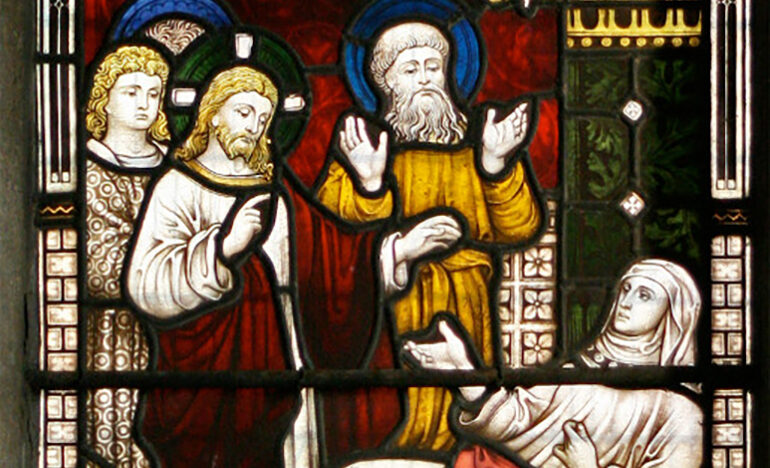Eucharistic Prayer III: Our Guaranteed Encounter with Christ

“The Eucharist: The Gift That Keeps on Giving … and giving, and giving.”
By Fr. Ron Will, CPPS
This is number eight in a series of videos on the Eucharistic prayers which we pray during Mass. This series is entitled: “The Eucharist: The Gift that keeps on giving, and giving, and giving.”
In his letter on the liturgy, Desiderio desideravi (I earnestly desire), Pope Francis speaks about the power of an encounter with Jesus: “The liturgy guarantees for us the possibility of such an encounter. For us a vague memory of the Last Supper would do no good. We need to be present at that Supper, to be able to hear his voice, to eat his Body and to drink his Blood. We need him. In the Eucharist and in all the sacraments we are guaranteed the possibility of encountering the Lord Jesus and of having the power of his Paschal Mystery reach us. The salvific power of the sacrifice of Jesus, his every word, his every gesture, glance, and feeling reaches us through the celebration of the sacraments.” (Apostolic Letter on the Liturgical Formation of the People of God, 11)
I realize that the prayers at Mass often go right over our heads because we do not know what to anticipate. We daydream through them. That’s why I am reflecting with you on the words of the Eucharistic Prayers, so that you will be more attentive and look for the meaning in what you hear the priest pray.
If you have followed this series, you know that there are 13 different Eucharistic Prayers from which the presider may choose; same structure, but each one emphasizes a different aspect of our relationship with God. I think that if I used the same Eucharistic Prayer every day, I would deprive you of a bigger picture of God; a bigger experience of God.
Today I am going to look at: Eucharistic Prayer III. In all Masses, we are celebrating Christ’s Passion, Christ’s Resurrection, Christ’s Ascension, and His second coming. When I receive Jesus, I become one flesh with him. And we know that this is a foretaste of heaven.
It’s one thing to say that we believe in the true presence of Jesus Christ in the Eucharist; it’s quite another to let that belief really sink in and change everything – our thoughts, our actions, our relationships. The challenge for us as Catholics is to make the profound truth of Jesus’ presence a profound reality in our lives. The Eucharist is not a something, but a someone, who is living and active in our world and who desires a relationship with us.
The question is: Are we simply going through the motions of faith, or do we have a personal, living relationship with Jesus Christ?
Thank you for joining me today.
I invite you to join me again next month, as I continue this series on “The Eucharist: The Gift that just keeps on giving, and giving, and giving.” We will then reflect on another one of the 13 Eucharistic Prayers that may be used during Mass.
May God bless you today and throughout the week.
All of the videos in this series can be found here: Reflections on the Eucharistic Prayers.
Never miss an article published on the Renewal Center website: Sign up to receive our newsletters.
[Fr. Ron Will, a Precious Blood priest and spiritual director, is a graduate of Catholic Theological Union and Creighton University’s School of Christian Spirituality. He has a special interest in helping form intentional disciples of Jesus, encouraging others to go spiritually deep-sea diving to explore a deeper relationship with God, and walking with people as they dive into the ocean of God’s mystery actually experiencing God rather than simply dipping one’s toe into the water.]
Photo ID 90444409 | Guaranteed © Encho Enevski | Dreamstime.com
We’d Like to Hear from You!
We’d like to know what you think about this article. Send us a comment using the form below. Do you have a suggestion? Is there something you want to learn more about? Send us a note.
Related

Making a Banner for Lent Part 2
A Coffee with Padre Video
Fr. Timothy finishes his Lenten banner and continues his reflections on how colors and materials become potent symbols that bring the Lenten season alive. The final banner serves as a visual reminder of our spiritual journeys.

Lent Video Four — Guided Meditation: ‘Traveling in the Dust of the Rabbi’
In this video, Fr. Ron reads the Gospel, Mark 1:29-34, for you and then leads you through a guided meditation, taking you deeper into that story. He calls this experience “an example of traveling in the dust of the rabbi.”
Categories
Assembling God's Puzzle Coffee with Padre Cooking & Spirituality Encounters of the 4th Kind Family Matters Reflections on the Eucharsitic Prayers Spiritual Resources Taize Prayers The Contemplative Life Traveling with Pilgrims of Hope Uncategorized Videos Week of Prayer for Uhristian Unity When you need a little help
